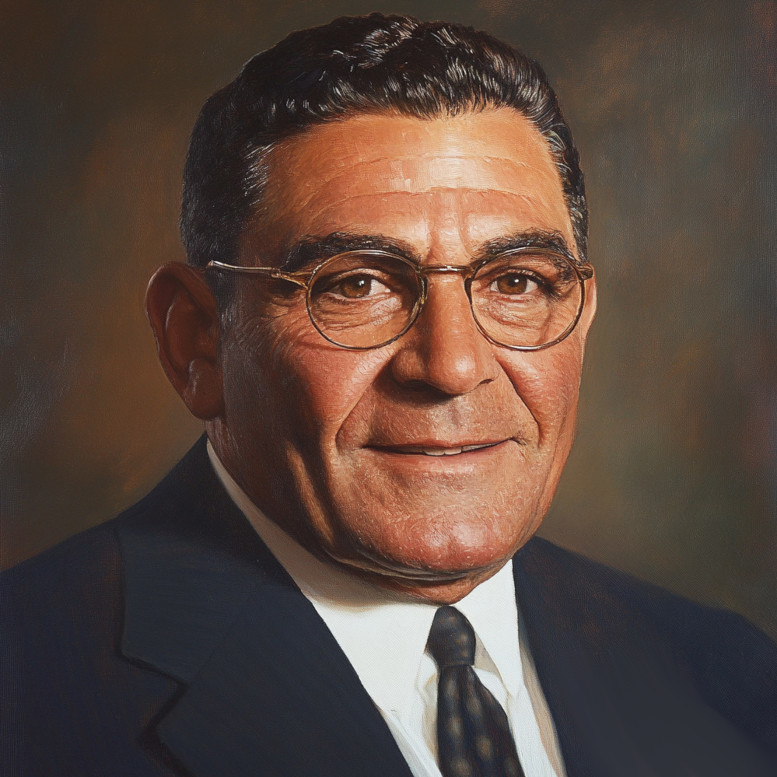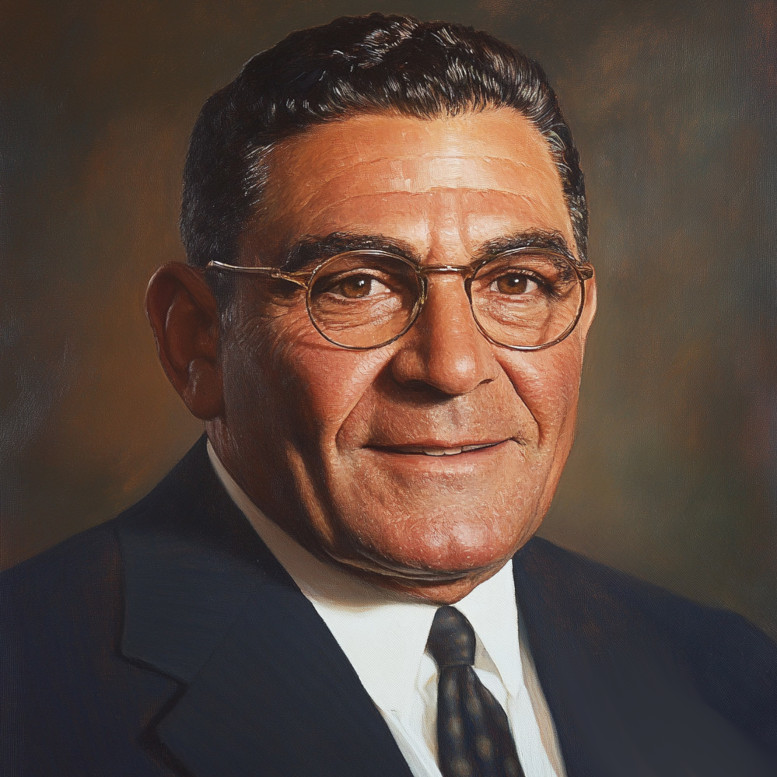


Vince Lombardi (1913–1970) was an American football coach and executive in the National Football League (NFL), widely regarded as one of the greatest and most successful coaches in the history of the sport. Known for his leadership, discipline, and motivational skills, Lombardi led the Green Bay Packers to five NFL championships in the 1960s, including victories in the first two Super Bowls. His emphasis on hard work, fundamentals, and team unity, as well as his ability to inspire and demand excellence, have made him a legendary figure not only in football but in the broader world of sports and leadership.
Early Life and Background
Birth and Family Background: Vincent Thomas Lombardi was born on June 11, 1913, in Brooklyn, New York, to an Italian-American family. His parents, Enrico "Harry" Lombardi and Matilda Izzo Lombardi, were devout Catholics who instilled strong values of faith, discipline, and respect in their five children. Lombardi was raised in a close-knit, hardworking community in the Sheepshead Bay neighborhood of Brooklyn.
Education and Early Football Career: Lombardi attended St. Francis Preparatory School, where he excelled in academics and athletics, particularly in football. He then went on to Fordham University, where he played as a guard on the football team. Lombardi was a member of the famed "Seven Blocks of Granite," Fordham's formidable offensive line, which became legendary for its toughness and effectiveness.
After graduating from Fordham in 1937, Lombardi pursued a career in law but soon realized that his true passion was football. He began his coaching career at St. Cecilia High School in Englewood, New Jersey, where he served as an assistant coach before becoming the head coach. His success at St. Cecilia laid the foundation for his future in coaching.
Coaching Career and Rise to Prominence
College Coaching: In 1947, Lombardi returned to Fordham University as an assistant coach, working under head coach Ed Danowski. He then moved on to become an assistant coach at the United States Military Academy at West Point under head coach Earl "Red" Blaik. Lombardi spent five years at West Point, where he honed his coaching philosophy and learned the importance of discipline, organization, and attention to detail.
Move to the NFL: In 1954, Lombardi made the leap to the NFL, joining the New York Giants as an offensive coordinator under head coach Jim Lee Howell. Lombardi's innovative offensive strategies, particularly his development of the power sweep, helped the Giants achieve significant success, including an NFL championship in 1956. His work with the Giants earned him recognition as one of the top coaching minds in the league.
Green Bay Packers and Championship Success
Hiring by the Green Bay Packers: In 1959, Vince Lombardi was hired as the head coach and general manager of the Green Bay Packers, a team that had fallen on hard times, winning just one game the previous season. Lombardi immediately set about transforming the team, instilling a culture of discipline, hard work, and relentless pursuit of excellence. His mantra, "Winning isn't everything; it's the only thing," became synonymous with his approach to coaching.
Championship Success:
NFL Championships: Under Lombardi's leadership, the Packers quickly became a dominant force in the NFL. In his first season, the Packers improved to a 7-5 record, and by 1960, they reached the NFL Championship Game. Although they lost to the Philadelphia Eagles, it was clear that Lombardi had turned the team around.
The Packers won their first NFL Championship under Lombardi in 1961, defeating the New York Giants. They repeated as champions in 1962, again defeating the Giants. Lombardi's Packers went on to win three more NFL Championships, in 1965, 1966, and 1967, cementing their status as one of the greatest teams in NFL history.
Super Bowl Victories: The 1966 and 1967 NFL Championship seasons culminated in victories in the first two Super Bowls. In Super Bowl I (1967), the Packers defeated the Kansas City Chiefs 35-10, and in Super Bowl II (1968), they defeated the Oakland Raiders 33-14. Lombardi's success in these early Super Bowls played a significant role in establishing the game as a premier sporting event in the United States.
Coaching Philosophy and Legacy
Coaching Philosophy: Vince Lombardi was known for his intense focus on fundamentals, discipline, and teamwork. He believed in rigorous preparation and demanded the highest level of effort and execution from his players. Lombardi was also a master motivator, using his fiery speeches and personal example to inspire his players to perform at their best. His emphasis on mental toughness, perseverance, and the importance of character made him not only a great coach but also a respected leader.
Lombardi was also ahead of his time in promoting equality and inclusion within his team. He treated all his players with respect, regardless of race or background, and he insisted on a unified team atmosphere where everyone was held to the same high standards.
Impact on Football and Leadership: Lombardi's success with the Packers and his broader influence on the sport of football have made him an enduring symbol of excellence in coaching. His methods and philosophies have been studied and emulated by coaches in various sports and fields. Lombardi's name is synonymous with leadership, and his quotes and teachings are often referenced in discussions about motivation, teamwork, and success.
Honors and Recognition: Vince Lombardi was inducted into the Pro Football Hall of Fame in 1971, just a year after his death. In recognition of his impact on the NFL, the league named the Super Bowl trophy the "Vince Lombardi Trophy" in his honor. This trophy, awarded annually to the Super Bowl champion, is one of the most prestigious symbols in sports.
Later Years and Death
Washington Redskins: After stepping down as head coach of the Packers in 1968, Lombardi took on the role of head coach and executive vice president of the Washington Redskins in 1969. In his one season with the Redskins, he led the team to its first winning record in 14 years, further demonstrating his ability to turn teams around. However, his time with the Redskins was cut short by his declining health.
Illness and Death: In 1970, Vince Lombardi was diagnosed with an aggressive form of colon cancer. Despite undergoing surgery, the cancer spread, and Lombardi passed away on September 3, 1970, at the age of 57. His death was mourned across the nation, and he was remembered as one of the greatest coaches and leaders in the history of American sports.
Legacy and Cultural Impact
Enduring Influence: Vince Lombardi's influence extends far beyond the world of football. His approach to leadership, his emphasis on values such as hard work, integrity, and teamwork, and his ability to inspire others have made him a role model in sports, business, and life. Lombardi's teachings are frequently cited in motivational speeches, leadership seminars, and management training programs.
Cultural Icon: Lombardi's image and words continue to resonate in popular culture. His famous quote, "Winning isn't everything, it's the only thing," though often misunderstood, reflects his commitment to excellence and the importance of giving one's best effort. Another of his well-known quotes, "The difference between a successful person and others is not a lack of strength, not a lack of knowledge, but rather a lack in will," highlights his belief in the power of determination and willpower.
Vince Lombardi was more than just a football coach; he was a leader, a motivator, and an icon of American sports. His success with the Green Bay Packers, his contributions to the NFL, and his enduring influence on leadership and teamwork have made him one of the most respected figures in sports history. Lombardi's legacy lives on through the Vince Lombardi Trophy, awarded to the Super Bowl champion each year, and through the countless coaches, players, and leaders who continue to be inspired by his example.

We use cookies
We use cookies and other tracking technologies to improve your browsing experience on our website, to show you personalized content and targeted ads, to analyze our website traffic, and to understand where our visitors are coming from. Privacy Policy.